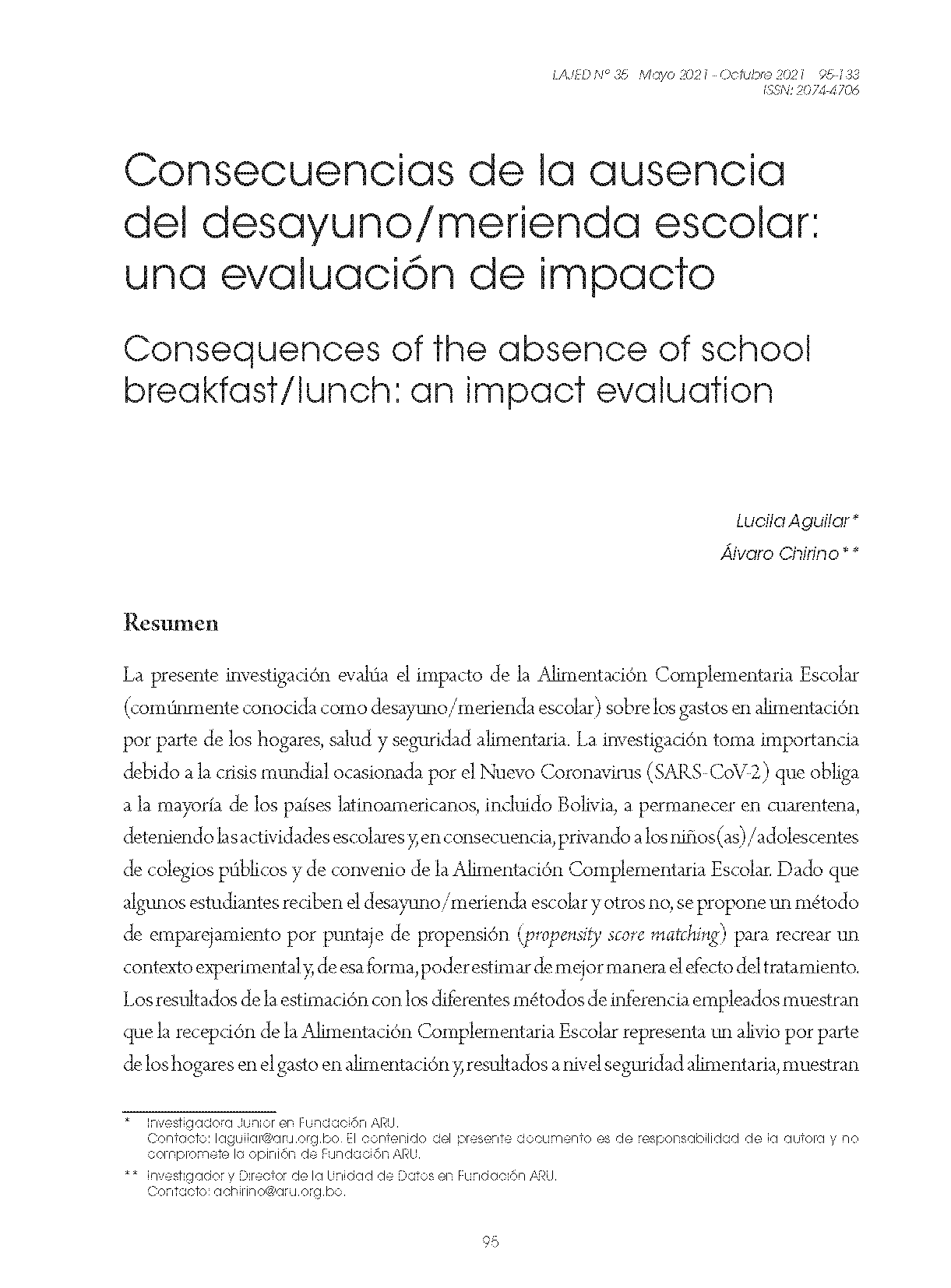Consequences of the absence of school breakfast/lunch: an impact evaluation
DOI:
https://doi.org/10.35319/lajed.202135440Keywords:
Impact evaluation, school breakfast, education, propensity score matchingAbstract
This research assesses the impact of Alimentación Complementaria Escolar (commonly known as school breakfast/snack) on household expenditure on food, health and food security. The research becomes important due to the global crisis caused by the New Coronavirus (SARS-CoV-2) that forces most Latin American countries, including Bolivia, to remain in quarantine, thus stopping school activities and, consequently, depriving the children/adolescents of public schools the Alimentación Complementaria Escolar. Given that some students receive school breakfast/snack and others do not, a propensity score matching method is proposed to recreate an experimental context and, thus, to estimate the average treatment effect in a better way. The results of the estimation with the different inference methods used show that the receipt of Alimentación Complementaria Escolar represents a relief in the expenditure on food that households make and, results at the food security level, show that the absence of school breakfast/snack increases the probability that the household perceives some degree of food insecurity.
Downloads
References
Agencia Municipal de Noticias (AMN). (10 de abril de 2020). La alimentación complementaria escolar se fortifica desde hoy para prevenir influenzas que incluyen al coronavirus. https://amn.bo/2020/03/02/la-alimentacion-complementaria-escolar-se-fortifica-desde-hoy-para-prevenir-influenzas-que-incluyen-al-coronavirus/
Barreto, M. (2015). Strengthening National Safety Nets School Feeding: WFP’s Evolving Role in Latin America and the Caribbean. World Food Programme. http://documents.wfp.org/stellent/groups/public/documents/resources/wfp281283.pdf
Bolivia. Ministerio de Educación; Ministerio de Salud. Lineamientos técnico administrativos, estándares de calidad de la alimentación complementaria escolar. La Paz, Bolivia. https://siteal.iiep.unesco.org/sites/default/files/sit_accion_files/bo_0274.pdf
Caliendo, M., y Kopeinig, S. (2008, 02). Some practical guidance for the implementation of propensity score matching. Journal of Economic Surveys, 22(1), 31-72.
Dercon, S., Park, A. y Singh, A. (2014, 01). School Meals as a Safety Net: An Evaluation of the Midday Meal Scheme in India. Economic Development and Cultural Change, 62(2), 275-306.
Grantham-Mcgregor, S., Chang, S. y Walker, S. (1998, 04). Evaluation of school feeding programs: Some Jamaican examples. The American Journal of Clinical Nutrition, 67(4), 785S-789S.
Heckman, J. J., Ichimura, H. y Todd, P. (1997). Matching as an Econometric Evaluation Estimator: Evidence from Evaluating a Job Training Programme. The Review of Economic Studies, 64(4), 605-654.
Heckman, J. J., LaLonde, R. y Smith, J. (1999). The Economics and Econometrics of Active Labor Market Programs. En Handbook of Labor Economics, vol. 3, ed. Orley Ashenfelter y David Card, 1865–2097. Amsterdam: North-Holland.
Horvitz, D. G. y Thompson, D. J. (1952). A generalization of sampling without replacement from a finite universe. Journal of the American Statistical Association, 47(260), 663-685. http://www.jstor.org/stable/2280784
Imbens, G. W. y Wooldridge, J. M. (2009). Recent developments in the econometrics of program evaluation. Journal of Economic Literature, 47(1), 5-86.
Kleinman, R. E., Hall, S., Green, H., Korzec-Ramirez, D., Patton, K., Pagano, M. E. y Murphy, J. M. (2002). Diet, breakfast, and academic performance in children. Annals of Nutrition and Metabolism, 46(S1), 24-30.
Lambert, J., Agostoni, C., Elmadfa, I., Hulshof, K., Krause, E., Livingstone, B., ... Samartín, S. (2004, 10). Dietary intake and nutritional status of children and adolescents in Europe. British Journal of Nutrition, 92(S2), S147-S211.
Maurer, K. M. (1984). The national evaluation of school nutrition programs: factors affecting student participation. American Journal of Clinical Nutrition, 40(2), 425-447.
Murphy, J. M., Pagano, M. E., Nachmani, J., Sperling, P., Kane, S. y Kleinman, R. E. (1998). The relationship of school breakfast to psychosocial and academic functioning: Cross-sectional and longitudinal observations in an inner-city school sample. Archives of Pediatrics and Adolescent Medicine, 152(9), 899-907.
Plataforma de Seguridad Alimentaria y Nutricional, SAN (10 de abril 2020). Programa Nacional de Alimentación Complementaria Escolar 2015-2020. Recuperado de https://plataformacelac.org/programa/166
Organización de las Naciones Unidas para la Alimentación y Agricultura. (2012). Escala latinoamericana y caribeña para la medición de la seguridad alimentaria y nutrición. Recuperado de http://www.fao.org/3/i3065s/i3065s.pdf
Pollitt, E. (1990). Malnutrition and infection in the classroom: Summary and conclusions. Food and Nutrition Bulletin, 12(3), 1-13. Recuperado de https://doi.org/10.1177/156482659001200304.
Rosenbaum, P. R. y Rubin, D. B. (1983, 04). The central role of the propensity score in observational studies for causal effects. Biometrika, 70(1), 41-55. https://doi.org/10.1093/biomet/70.1.41.
Sidaner, E., Balaban, D. y Burlandy, L. (2013). The Brazilian School Feeding Programme: An Example of an Integrated Programme in Support of Food and Nutrition Security. Public Health Nutrition, 16(6), 989-994.
Soares, P., Davó-Blanes, M. C., Martinelli, S. S., Melgarejo, L. y Cavalli, S. B. (2017). The Effect of New Purchase Criteria on Food Procurement for the Brazilian School Feeding Program. Appetite, 108, 288-294.
Sorhaindo, A. y Feinstein, L. (2006, 06). What is the relationship between child nutrition and school outcomes? https://discovery.ucl.ac.uk/id/eprint/10015414/
Wooldridge, J. M. (2002). Inverse Probability Weighted M-Estimators for Sample Selection, Attrition, and Stratification. Portuguese Economic Journal, 1(2),117-139.
World Food Programme Organisation (2017). Smart School Meals. Nutrition-Sensitive National Programmes in Latin America and the Caribbean. https://docs.wfp.org/api/documents/WFP-0000019946/download/






